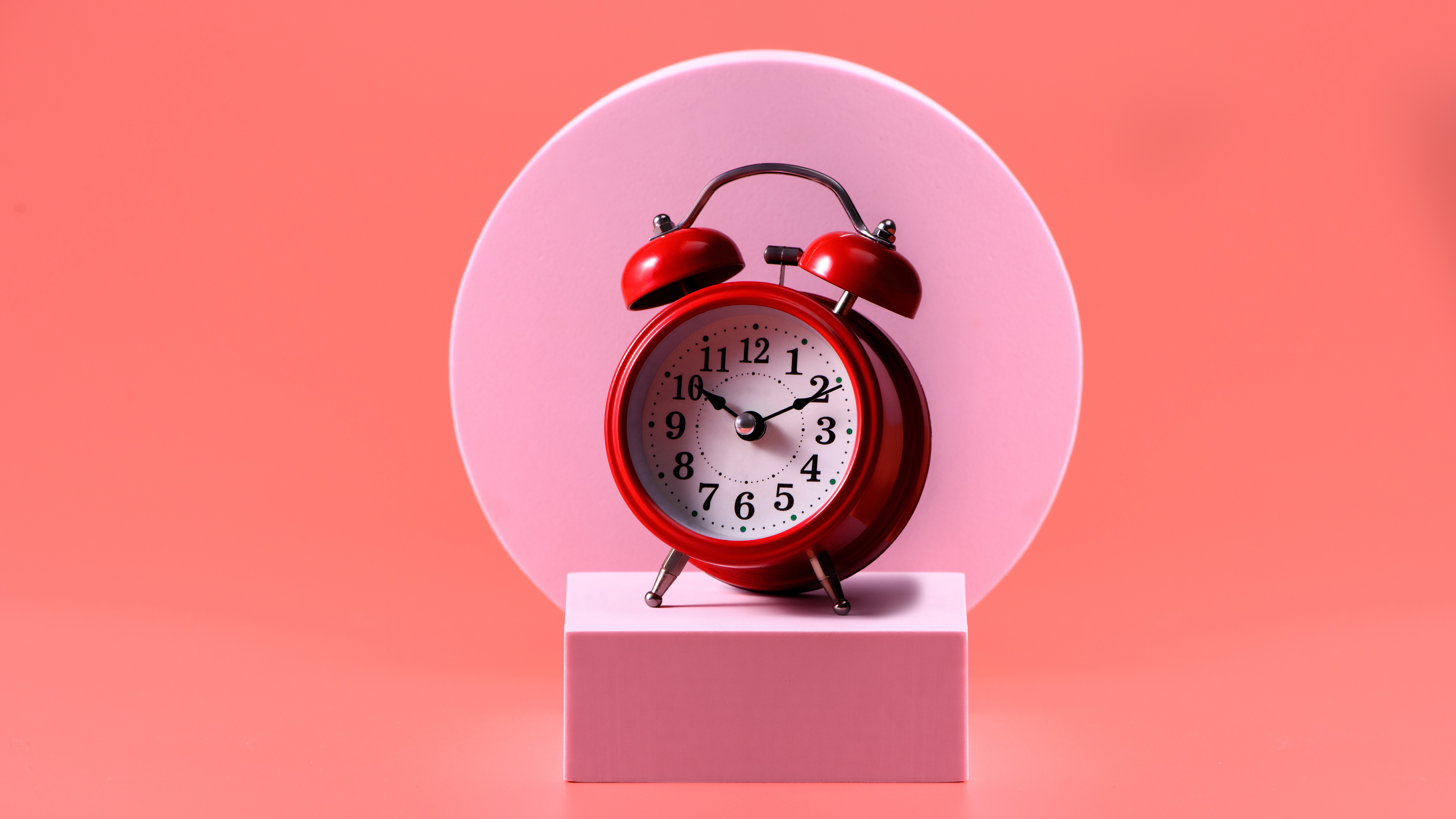Why am I waking up at the same time every night? Sleep experts reveal exactly what’s disturbing your slumber and how to fix it
Find yourself waking up at the same time every night? Here are 6 ways to overcome it


If you’re waking up at the same time every night, you’re not alone. Over 50 million Americans suffer from sleep problems at some point in their lives, whether that’s struggling to fall asleep, struggling to stay asleep or waking up at the same time every night. Luckily, there are actions you can take to nip sleep disturbance in the bud once and for all and stop waking up in the middle of the night.
Sleep has become a billion-dollar business, with the desire for sweet and peaceful dreams somewhat universal. From pillows to mattresses and sleep apps to CBD for sleep, there’s a myriad of products promising to help you figure out how to sleep better.
Waking up in the middle of the night once in a while and for short periods of time is not usually something to worry about. However, if you find yourself consistently waking up at 3am you'll start to feel tired and groggy in the days that follow. This can be frustrating and cause further sleep problems or anxiety at the thought of another restless night.
"Sleep is fundamentally important to our health," says Dr. Roshane Mohidin, Healthcare Pathways & Behaviour Change Manager at Vitality. "Most of the adult population require around eight hours of quality sleep, and a lack of sleep can have a real impact on mood and concentration levels as well as leading to increased feelings of irritability or anxiety.
"Prolonged sleep loss can also weaken the body’s immune system and render it prone to colds or other infections, as well as increasing the risk of serious conditions like heart disease and diabetes."
Luckily there are steps you can take to determine why exactly you're waking up at the same time every night and find the best treatment for you.
Why you're waking up at the same time every night
There are many factors that can cause sleep problems, but the most common cause of waking up at the same time every night is a disruption to the sleep cycles.
Sign up for the woman&home newsletter
Sign up to our free daily email for the latest royal and entertainment news, interesting opinion, expert advice on styling and beauty trends, and no-nonsense guides to the health and wellness questions you want answered.
In those ideal eight hours of sleep per night, we go through four to six sleep cycles, with each cycle lasting for around 90 minutes.
The first sleep cycle, known as NREM, is the lightest phase. Your body and brain aren’t totally relaxed in this state, so you might twitch or move. It’s very easy for someone to wake up in this cycle, however, if sleep isn’t disrupted, the next cycles will be deeper.
If you find yourself waking up at 3am every night, it's likely your body isn’t moving through the sleep cycles and spending more time in the lighter stages of sleep, where it's much easier to wake up.
The root causes preventing your body from cycling through the sleep stages include everything from lifestyle choices to health conditions. While there are some factors you can't control, such as age, there are other lifestyle factors worth addressing for a better night’s sleep.
Most common causes of sleep disturbance
Lifestyle factors
"Light sleep is caused by various factors, but a common one is stress," says Şirin Atçeken, a Psychologist and Therapist at WeCure. "Our bodies respond to stress, and this manifests within the body and our psyche. We may experience stress-related dreams, and dream scenarios in our subconscious that jolt our conscious awake to deal with, and address them."
Alcohol may help some people fall asleep easier but once the effects wear off and the liver metabolizes the alcohol, it can cause disturbances later in the sleep cycle. As with drinking any liquid before bed, consuming a large quantity of alcohol can also cause your body to interrupt its own sleep cycle with the urge to use the bathroom.
Changes to your routine can also affect how often you wake during the night. A few days of poor sleep can upset your circadian rhythm and shift your body’s sleep cycles, which is why erratic shift work or having a baby to look after can wreak havoc on your sleep quality.
"Going to bed and waking up at different times doesn’t promote good quality sleep, but conditions our brain to expect erratic sleep patterns. Working late, or doing brain-stimulating activities before bed can also cause us to have a restless night. If our brain is active during the night, it's unable to form deep sleep patterns, so we experience light or restless sleep, often partnered with vivid dreams," says Şirin.
Age
The quality and duration of our sleep cycles are also affected by a number of factors we aren’t able to control, such as our age. Babies spend about 50% of their time asleep in REM sleep and may enter a REM stage as soon as they fall asleep. As we age, we spend less time in REM sleep, the phase which is associated with memory consolidation, cognitive function and creativity. While we can’t control how our body changes as we age, we can focus on tackling any lifestyle factors that might be exacerbating our sleep problems.
Health conditions
Many people suffer from sleep disorders that prevent them from sleeping through the night and interrupt a healthy sleep cycle. Those with sleep apnea tend to wake up during cycles of deeper sleep, while those with insomnia or sleep anxiety may find repeated disturbance to their sleep cycles is now causing them to wake up at the same time every night. If you’re suffering from a sleep disorder or sleep anxiety, seek further advice from your doctor on the best treatment for you.
How to stop waking up at the same time every night
For the most part, poor sleep is influenced by a variety of factors that we have some level of control over. But, could the answer to your sleep problems be as simple as developing a better daytime and bedtime routine? Dr. Mohidin suggests so.
"A regular daily routine helps to maintain some structure to our day and keep the body’s sleeping patterns in sync," explains Dr. Mohidin "When this is disrupted, it can make it more challenging for your body to know when you want to go to sleep and cause you to wake up during the night."
Here are a few steps you can take to create a better routine that encourages a great night’s sleep.
1. Practice good sleep hygiene
Sleep hygiene is a term that generally describes the way you approach sleep. Good sleep hygiene can include creating a calm sleep environment with no distractions and developing a consistent routine that will train your brain and body to enter and move through healthy cycles of sleep. Implementing good sleep hygiene into your bedtime routine can include anything from listening to calming music, practicing meditation or doing bedtime yoga. The most important thing is that you make it a part of your nightly routine.
Perfect uninterrupted cycles of sleep won’t happen straight away, but going to bed at the same time every night and waking up at the same time every morning will help train your body and mind to work through the sleep cycles naturally.
2. Avoid electronics for an hour before bed
Exposure to blue light from smartphones, computers and TV screens suppresses the production of the sleep hormone, melatonin, and keeps the brain wired and awake. If the brain can’t shift into the first phase of sleep, not only will you find it’s harder to drift off, but you may be waking up more often during the night.
"We’ve invaded the night," says Dr. Russell Foster, the director of the Sleep and Circadian Neuroscience Institute at the University of Oxford, "We’ve fitted more and more into the working day and sleep has been the first victim." Try putting your devices away and on airplane mode at least an hour before bed to give your brain a chance to naturally shift to relaxation mode.
3. Avoid stimulants like caffeine
Drinking a cup of tea, coffee or even a sports drink can promote more activity in your brain and body and disrupt natural sleep cycles. Alcohol and sugar will also have a role to play in this, so limit your intake of stimulating foods and drinks – this includes protein shakes and the likes of natural energy-giving whole foods and drinks too. While it’s okay to have a cup of coffee in the morning, try to avoid any caffeinated food or drink at least four hours before bed. Instead, drink a sleep tea for your evening hot drink fix.
4. Exercise regularly to boost sleep hormones
Not only is moving your body an instant mood-booster, but it also naturally boosts your sleep hormones. There’s no need to overdo it and spend hours in the gym, just gentle exercise and deep breathing can help to regulate your nervous system and get you ready for rest. Exercising regularly will also help to maintain your circadian rhythm, and help you stick to your sleep routine. Quick at-home workouts four times a week will keep you healthy and fit, and help you sleep better.
5. Eat a balanced diet
No one diet is right for everyone but ensuring you consume plenty of fiber, healthy fats and fruits and vegetables will help your body to function properly, aid digestion, fight inflammation and disease and prevent spikes in brain activity and stress hormones throughout the night. Heavily processed and oily foods, especially when consumed before bed, mean the gut has to work harder and the body may not be able to focus on maintaining regular sleep cycles effectively. Eating too close to bedtime will have your body struggling to digest your food properly, so it’s best to eat your evening meal at least four hours before sleep.
6. Look after your mental wellbeing
Noticing and acknowledging stress and anxiety is an important first step to looking after your mental wellbeing. If you find yourself waking up at the same time every night, mind racing, write down your thoughts and feelings and explore what’s really on your mind.
If you have sleep anxiety or find you’re more anxious at night time, set time aside to encourage your body and mind to relax before bed. Have a warm bath to wind down and lower your body temperature—this will signal to the brain that it’s time for sleep. You could also listen to sleep-guided meditations on sleep apps or read a book until you feel sleepy.
If your sleep anxiety or sleep disruption persists, speak with your doctor for further advice to help you determine alternative causes and effective treatments.
Emilie Lavinia is a writer, entrepreneur and women’s wellbeing advocate. She is passionate about femtech, closing the gender health gap and campaigning for education and transparency across mental, physical and sexual health. Emilie presents All Being Well – a series that investigates the concept of wellness, good health according to experts and what it means to ‘be well’. She has a decade of experience as a journalist, editor and brand strategist and is the founder of four separate organisations that champion women’s health, marginalised communities and LGBTQ+ people.
-
 Le Creuset has taken the gold standard literally — their 100 year launch features real gold and an iconic designer collaboration
Le Creuset has taken the gold standard literally — their 100 year launch features real gold and an iconic designer collaborationLe Creuset have turned 100 years old and to celebrate they have launched a new colour — Flamme Dorée — as well as a coffee table book with designers Assouline
By Laura Honey Published
-
 This chic, Brazillian perfume brand is our beauty team's secret to smelling expensive and unique
This chic, Brazillian perfume brand is our beauty team's secret to smelling expensive and uniqueFrom salty accords to modern twists on tuberose, there's a Granado perfume for every preference - but these 9 blends have our heart...
By Naomi Jamieson Published